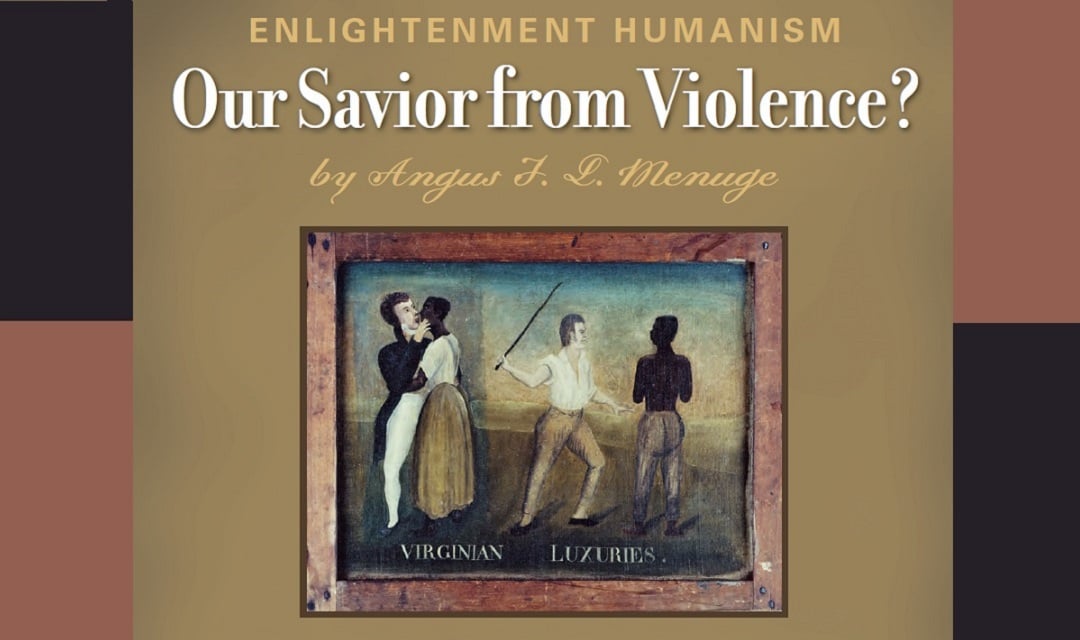This article first appeared in the CHRISTIAN RESEARCH JOURNAL, volume 34, number 06 (2011). The full text of this article in PDF format can be obtained by clicking here. For further information or to subscribe to the CHRISTIAN RESEARCH JOURNAL go to: http://www.equip.org/christian-research-journal/
Across many time scales, there is a general downward trend in human violence. On average, today’s human beings are less violent than their ancestors in medieval and ancient times. Proportional to total world population, the latter were more warlike and homicidal, more prone to genocide, torture, and cruel punishments for real or imagined crimes, and they sanctioned horrific abuse of women and children. Despite the setback of two world wars, the twentieth century showed a further decline in interstate and civil wars and in other forms of violence as well. Perhaps man’s inhumanity to man is coming under control. That is the message of Steven Pinker’s latest work, The Better Angels of Our Nature: Why Violence Has Declined (New York: Viking Penguin, 2011).
ARE WE LEARNING SELF-CONTROL?
Pinker, a professed atheist, is professor of psychology at Harvard University and the author of several works of popular social science, including How the Mind Works and The Blank Slate. His new book—a seven-hundred-page synthesis of history, sociology, psychology, and philosophy —seeks to understand the factors that promote or reduce violence. Pinker’s historical data include six trends and five forces that could account for observed declines in violence. The trends include: a pacification process as we moved from anarchic hunter-gatherer societies to agricultural civilizations with cities and governments; the civilizing process, especially in western Europe, as the feudal territories of the medieval period were consolidated into large kingdoms with increasingly centralized power; the humanitarian revolution during the “Age of Reason,” which upheld the rights of individual men against slavery, torture, and superstitious and sadistic punishment; the long peace following World War II; the new peace after the end of the cold war in 1989; and the rights revolution, starting with the Universal Declaration of Human Rights in 1948, and continuing with calls for civil rights, women’s rights, and for gay and animal rights.
Probably the most important of the five forces promoting peace is what philosopher Thomas Hobbes called the “Leviathan” of the modern state, created when humans gave up their natural urge to raid and kill their competitors, and granted the state a monopoly on legitimate force in exchange for greater security. Other engines of pacification include: commerce, which builds ties of codependence; feminization, since women are less violent than men and exert a civilizing influence on institutions; and cosmopolitanism, since rubbing shoulders with a diversity of people reduces the prejudice that fuels animosity. Finally, there is the escalator of reason: over time, humans learn that aggression can trap people in cycles of violence and thwart even the self-interested goals that depend on mutual cooperation.
Pinker does not believe in God, angels, or demons. But he does think that secular psychology has revealed five factors that make human beings prone to violence, and four that help to inhibit those tendencies. The five “inner demons” include: predatory or instrumental violence, which encourages us to hurt others as a means to our own selfish ends; dominance, associated with macho posturing for honor, status, and glory; revenge, which fuels long-lasting cycles of violence; sadism, which not only drives serial killers but can arise from habituation to cruelty; and ideology, a grand utopian vision that allows virtually unlimited violence to achieve its goals. While Pinker rejects the Christian idea of original sin, he inadvertently confirms it when he maintains that all five of these demons have a neurological basis common to all human beings. What he says about self-serving bias and self-deception (p. 489–92) also agrees with Jesus’ teaching about sin (Matt. 7:3–5).
Opposing these demons are the four better angels: empathy, especially in the sense of sympathetic concern, where we come to identify with another person’s pain; self-control, as we defer or forego the gratification of our impulses; the moral sense, which can lead us to accept community norms and taboos as sacred, sometimes for the better; and reason, which not only helps us to think through what will really make us better off in the longer term, but also enables us to escape our parochial viewpoint.
HEROES AND VILLAINS
In many ways, Pinker exalts reason as the most important angel, the one that he thinks first became ascendant in the seventeenth century—the so-called Age of Reason. Throughout his retelling of the history of human violence, Enlightenment humanism is promoted as the leading cure for our predicament. As Pinker understands it, Enlightenment humanism consists of a number of elements. It affirms our fallibility and declares that “faith, tradition, dogma, authority, the ecstatic glow of subjective certainty—all are recipes for error, and should be dismissed as sources of knowledge” (p. 180). In its place, humanism affirms logic and the empirical method of science, and asserts that the “universality of reason…defines a place for morality” (182).
Among the villains of Pinker’s epic are religion and ideologies that feed totalitarianism. Against Christianity, Pinker parades the usual horrors of inquisitions, crusades, religious wars, and brutal punishments for heresy and witchcraft. He asserts that slavery “was upheld in the Hebrew and Christian Bibles” (153) and argues that Christianity sanctions the torture of unbelievers: “If you really believe that failing to accept Jesus as one’s savior is a ticket to fiery damnation, then torturing a person until he acknowledges this truth is doing him the biggest favor of his life: better a few hours now than an eternity later” (17).
Further, Pinker claims that God Himself is a morally repugnant figure, “who delights in genocide, rape, slavery, and the execution of nonconformists” (676). He concludes that “the theory that religion is a force of peace…does not fit the facts of history” (677).
REVISIONIST HISTORY
To hear Pinker tell it, slaves, outcasts, the poor, women, and children only received recognition as having full human dignity during the Age of Reason, and the ideals of Enlightenment humanism deserve most of the credit. However, as Alvin Schmidt has shown,1 the truth is more complicated. Schmidt shows a stark contrast between the ancient pagan world and the early church. The ancient Greeks and Romans fled the sick and the poor; they committed widespread abortion, infanticide, and child abandonment; they viewed women as property not to be seen (alone) or heard in public and as subject to harsh treatment (under the law of patria potestas, the Roman father had exclusive right to divorce and punish his wife, and, under some circumstances, he could even kill her without a trial); and they never criticized slavery in any way. Inspired by Christ’s own example and teaching, Christians of the early church ministered to the sick and instituted the first hospitals; they fed the hungry and cared for the poor; they adopted abandoned children and survivors of abortion; they massively improved the status of women, who were among Jesus’ own disciples and had important roles in the early house churches; and they, not Enlightenment humanists, were the first to emancipate slaves in the second and third centuries.
Indeed, both Constantine and Augustine explicitly opposed slavery in the fourth century, Augustine teaching that slavery was the result of sin and contrary to God’s plan for humanity (The City of God 19.15). By the fourteenth century, slavery had almost disappeared, and its reappearance in the British and American slave trade arose from a mixture of greedy colonial exploitation and a patent misreading of scripture. In the Old Testament, God calls for slaves to be freed in their seventh year (Deut. 15:12), and condemns selling the poor into slavery (Amos 2:6 and 8:6). In the New Testament, some claim that 1 Corinthians 7:21 sanctions slavery, since Paul says a Christian slave may have to remain in his position. But Paul’s point is that Christians can witness through patient suffering of injustice: he is not saying slavery is a good thing. Paul does not encourage the slave to run away, as this would be unlawful and dangerous to the slave. He does explicitly say that slavery is not the ideal: “But if you can gain your freedom, avail yourself of the opportunity. For he who was called in the Lord as a slave is a freedman of the Lord….You were bought with a price; do not become slaves of men” (1 Cor. 7:21b–23 ESV). And in Paul’s letter to Philemon, his whole point is that Philemon should accept his slave Onesimus back, “no longer as a slave but…as a beloved brother” (Philem. 16 ESV).
Pinker follows the New Atheists (Richard Dawkins, Daniel Dennett, Christopher Hitchens, and Sam Harris) in painting Judeo-Christianity as the mother of all wars. A favorite example is God’s commanding Joshua to slay the Canaanites, which the New Atheists take to be divine sponsorship of genocide. Paul Copan has shown, however, that the New Atheists misunderstand the theology of the Old Testament.2 For one thing, humanists like Pinker incorrectly assume that God is subject to the same moral constraints as a human being. But as the creator, God has the absolute right of life and death over His creatures. Further, in commanding Joshua to slay the Canaanites, God was calling for capital punishment of a horrifically sinful people who would otherwise corrupt the faith of His chosen nation. But the New Atheists also fail to understand that the civil and ceremonial laws of ancient Israel were only temporary, and do not bind Christians today (Jer. 31:31–34; Heb. 9:12). Many of the positive laws of ancient Israel were only concessions to the people’s hardness of heart (Matt. 19:8).
Further, when citing the prevalence of religious wars and persecutions, Pinker fails to distinguish actions of nominal Christians from actions approved by Christ’s own example and teaching. Jesus does not advance His kingdom through violence, and reprimands His disciples for doing so, saying that those who live by the sword will die by the sword (Matt 26:52). Oddly, Pinker repeats this saying without acknowledging its source (159). Jesus also clarifies an important point missed by the New Atheists: His kingdom is not a worldly kingdom (John 18:36). Neither Christ nor Paul advocate theocracy or forced conversions. They teach that secular government has authority from God (John 19:11; Rom. 13), and that faith is the work of God (Matt. 16:17; 1 Cor. 3:7), so it cannot be created by torture or any other human work.
HUMAN RIGHTS
Pinker repeatedly insists that human rights are founded in the insights of Enlightenment humanism, which claims that, independent of God, human reason can establish the value of each individual. But, without God, nature is all there is. From a naturalistic perspective, human beings are the result of the “blind watchmaker” of natural selection, which did not have us in mind, and did not place any value on our lives. True, we are adapted to our environment, but as James Rachels points out, the same can be said for the humble cockroach: “We are not entitled—not on evolutionary grounds, at any rate—to regard our own adaptive behavior as ‘better’ or ‘higher’ than that of a cockroach, who, after all, is adapted equally well to life in its own environmental niche.”3
While it is true that humans in general have more highly developed capacities than other creatures, it is not true that all human beings have capacities higher than all other creatures. It is precisely on this basis that the utilitarian philosopher Peter Singer argues, “If we must choose between saving an intelligent, fully developed pig or the Down Syndrome baby,…we should opt for the pig.”4 And within the human population, natural advantages (like intelligence and strength) are not uniformly distributed, so “why should we treat all people equally in any respect in the face of manifest inequalities among them?”5
Pinker hopes to avoid this conclusion by appealing to the “universality of reason,” citing Kant’s categorical imperative (182): a rational being should only do those actions he can will everyone to do. But Kant failed to show that it is irrational for the dictator to reason that others are not in fact capable of the oppressive violence he intends. Without a change of heart, reason does not compel the recognition of universal human rights. And the idea that we have inalienable human rights derives from Scripture: we are specially made in the image of God (Gen. 1:26–28), and worldly distinctions of wealth, social status, and gender make no difference to Christ (Matt. 25:40; Gal. 3:28).
FIRST AND SECOND THINGS
Near the end of his book, Pinker acknowledges that “I have been assuming that violence is always a bad thing except when it prevents greater violence” (686–87). But it is odd to think that we can simply define human progress in terms of the reduction of violence. For it is surely possible that we could achieve universal peace by genetic engineering, psychological conditioning, and drugs; yet that would be a dystopic nightmare, not an ideal world. Nonviolence is not a morally first thing that is valued for its own sake, but a morally second thing, valued if it supports such ends as liberty and justice, which we value for their own sake. C. S. Lewis’s reflections on pacifism are helpful here: “The doctrine that war is always a greater evil seems to imply a materialist ethic, a belief that death and pain are the greatest evils. But I do not think they are. I think the suppression of a higher religion by a lower, or even a higher secular culture by a lower, a much greater evil.”6 Lewis’s point is that violence is not only justified as a last resort to reduce greater violence, but may even be necessary to defend the primary goals of human flourishing.
Violence usually is a terrible thing, and we can all be grateful for many of the advances in civilization that Pinker cites. Yet much that is admirable in Pinker’s moral convictions is borrowed capital: it does not derive from the universal reason of man, but is rooted in the Christian revelation he rejects. Despite this, Pinker’s controversial book offers much food for thought about human depravity and civilization, and is well worth the read.
Angus J. L. Menuge holds a B.A. in philosophy from Warwick University, a Ph.D. in philosophy from the University of Wisconsin-Madison, and a Diploma in Christian Apologetics from the International Academy of Apologetics, Evangelism, and Human Rights. He is author of Agents Under Fire: Materialism and the Rationality of Science (Rowman and Littlefield, 2004) and many articles on the philosophy of mind, philosophy of science, and Christian apologetics, and editor of several collections, including Reading God’s World: The Scientific Vocation (Concordia, 2004).
NOTES
- Alvin Schmidt, How Christianity Changed the World (Grand Rapids: Zondervan, 2004). See, especially, chaps. 2, 4, 5, 6, and 11.
- Paul Copan, Is God a Moral Monster? Making Sense of the Old Testament God (Grand Rapids: Baker Books, 2011).
- James Rachels, Created from Animals: The Moral Implications of Darwinism (Oxford: Oxford University Press, 1999), 70.
- Logan Paul Gage, “Can a Thomist Be a Darwinist?” in God and Evolution, ed. Jay Richards (Seattle: Discovery Institute Press, 2010), 187–202, 191.
- J. P. Moreland, The Recalcitrant Imago Dei: Human Persons and the Failure of Naturalism (London: SCM Press, 2009), 144.
- C. S. Lewis, “Why I Am Not a Pacifist,” in The Weight of Glory and Other Addresses, ed. Walter Hooper (New York: Macmillan, 1975), 43.









